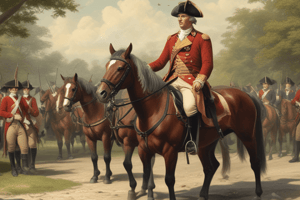Podcast
Questions and Answers
What is a key characteristic when adding glow to an original painting?
What is a key characteristic when adding glow to an original painting?
- Glow needs to be subtle to avoid overpowering the initial artwork. (correct)
- Glow effects are exclusively achieved using digital editing software.
- It requires the use of specific, high-end paint brands.
- It always involves completely covering the original painting with a layer of fluorescent material.
When should artists usually consider adding dimensionality to their work?
When should artists usually consider adding dimensionality to their work?
- If they aim to provide a more interactive or engaging viewing experience. (correct)
- Primarily when the original piece already features sculptural components.
- As a standard practice for all artworks before exhibition.
- Only when requested by art galleries or curators.
What is the primary requirement for artists adding Augmented Reality (AR) to their art?
What is the primary requirement for artists adding Augmented Reality (AR) to their art?
- Extensive knowledge of high-end 3D animation.
- Familiarity with AR software or collaboration with a technologist. (correct)
- A deep understanding of blockchain technology.
- Certification in digital marketing for promoting AR art.
How do dimensional enhancements alter the observer's interaction with the artwork?
How do dimensional enhancements alter the observer's interaction with the artwork?
Regarding the integration of light with a painting, what is a crucial condition to consider?
Regarding the integration of light with a painting, what is a crucial condition to consider?
What should artists avoid when altering their original paintings?
What should artists avoid when altering their original paintings?
In the context of art, what does 'glow' typically imply when added to an initial artwork?
In the context of art, what does 'glow' typically imply when added to an initial artwork?
Why might an artist choose to add augmented reality (AR) to a pre-existing painting?
Why might an artist choose to add augmented reality (AR) to a pre-existing painting?
Which factor is most important when incorporating light into a traditional painting?
Which factor is most important when incorporating light into a traditional painting?
What primary concern should influence an artist's choice to digitally 'alter' a piece?
What primary concern should influence an artist's choice to digitally 'alter' a piece?
Flashcards
What is a phoneme?
What is a phoneme?
A symbol that represents a single sound in a language.
What is a morpheme?
What is a morpheme?
A unit of meaning in a language, usually a single word.
What is phonology?
What is phonology?
The study of how sounds are put together in a language.
What is morphology?
What is morphology?
Signup and view all the flashcards
What is syntax?
What is syntax?
Signup and view all the flashcards
What is semantics?
What is semantics?
Signup and view all the flashcards
What is pragmatics?
What is pragmatics?
Signup and view all the flashcards
What is an oral language?
What is an oral language?
Signup and view all the flashcards
What is graphology?
What is graphology?
Signup and view all the flashcards
What is diachronic linguistics?
What is diachronic linguistics?
Signup and view all the flashcards
Study Notes
The Stamp Act
- Britain and France fought over land in North America, costing Britain a lot of money.
- Britain borrowed money to pay for supplies and protection for the colonists.
- The British government believed colonists should help pay for the war.
- This involved the protection of colonists from the French and other tribes, allowing them more land.
- To pay for the war, the British government imposed new taxes on colonists.
- King George III introduced the Stamp Act, a tax on printed materials (newspapers, paper, licenses, playing cards).
- Stamps were placed directly onto the paper goods.
- Colonists were opposed to the Stamp Act, believing it unfair because they had no representation in the decision to tax them.
- In today's society, people vote on taxes and elect representatives to speak for them.
- Before the Stamp Act, colonies had the ability to decide on their own taxes.
- Colonists elected representatives to decide on taxes and laws, and elected individuals to discuss & vote on these issues.
- Colonists voiced their concerns through peaceful protests, letters, and petitions.
- British rule had become distant to the colonists, seeming unfair.
- Colonists desired a say in decisions affecting their lives.
- Growing conflicts intensified between the colonists and the British government.
Studying That Suits You
Use AI to generate personalized quizzes and flashcards to suit your learning preferences.




